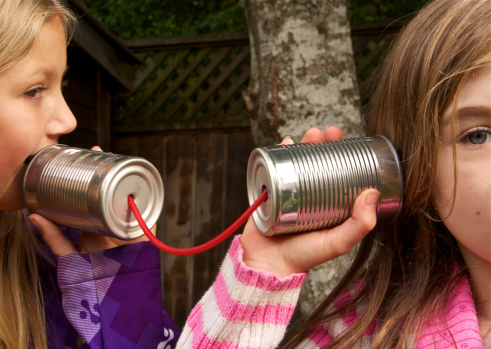 On lists of life stressors, divorce is usually ranked among the top two or three most emotionally challenging events. The process itself is experienced as highly stressful by many people, and from what we know about recovery from profound loss, it takes at least a year to begin to regain equilibrium. In other words, the stress caused by a divorce does not usually just go away when the decree is signed. Especially in situations in which there has been a high level of tension and acrimony during the divorce process, it can be very difficult to shift from conflict mode to co-parenting mode if there are children in the family.
On lists of life stressors, divorce is usually ranked among the top two or three most emotionally challenging events. The process itself is experienced as highly stressful by many people, and from what we know about recovery from profound loss, it takes at least a year to begin to regain equilibrium. In other words, the stress caused by a divorce does not usually just go away when the decree is signed. Especially in situations in which there has been a high level of tension and acrimony during the divorce process, it can be very difficult to shift from conflict mode to co-parenting mode if there are children in the family.
New sources of stress can arise post-decree, e.g. introducing children to new significant others, a parent’s decision to move, loss of a job, children struggling to adapt to the new normal. It is normal for these kinds of change to create uncertainty and distress.
When contemplating a divorce, many people turn to divorce professionals for ideas, advocacy and support. This can lessen feelings of isolation and uncertainty during a time of crisis. However, after the decree has been submitted to the court, people may feel they are on their own to pick themselves up and commence with the rest of their lives.
It has been my experience that specific post-decree support provided by neutral coaches and neutral child specialists can be an invaluable resource for families defining their new normal after a divorce. In the context of voluntary post decree alternative dispute resolution, resources can be shared, support given, and skills developed for effective co-parenting. Parenting and relationship plans can be created (if not completed during the divorce itself) or revised by joint agreement. In the context of voluntary alternative dispute resolution, children can be safely included in this process, e.g. to check in about their adjustment to new schedules and routines. It has been suggested that follow up care like this should be offered to all divorcing couples, though not all may need it.
This is not a replacement for psychotherapy. Individual therapy can enhance personal growth, provide support and help adults and children heal emotionally. Couples therapy specific to the end of marriage can help resolve lingering emotional issues and conflict. Family therapy may be valuable, especially if relationship repair between parents and children is needed. It is also not a replacement for support groups or resources like Daisy Camp. However, post-decree consultation with neutral experts who specialize in helping family members make the healthiest possible adjustment to a divorce can be a focused and powerful kind of support during a challenging time of transition.
 In my work with families making the shift from one to two households for their children, I often remind parents that transitions between homes are typically bothersome for kids. I use the personal example of going on vacation to explain this: I love my job, and I love going on vacation, once I get there. It’s the transitions in between that I don’t look forward to at all. What do I need to remember to pack? Did I forget something important? Will I know what to expect when I get there? Will I get enough sleep? Transitions by definition take us out of one routine and into another—and kids usually do best with predictable routines. So how can attuned parents help make transitions less stressful? Here are five tips:
1. When relocating after a divorce or break-up, strongly consider whether it would be possible to live within biking distance of each other. I hear all this wish expressed all the time from kids. It helps them feel less worried about forgetting something at the other house, because retrieval would be easier. It also gives them a sense of personal agency to imagine they could bike over to Mom’s or Dad’s on their own power.
2. Ensure that kids have ample supplies of what they feel is important to have at both houses. No, you won’t need to buy two saxophones, but you may need to invest in particular kinds of shampoo and conditioner, multiple special pillows or specific games to have at each home. Having photos of the other parent in the kids’ bedrooms will also help.
3. Be very mindful of the emotional tone of transitions. Focus on what the kids need, which is a respectful and calm exchange. Anything else and kids will feel in the middle. Transitions are not the time to try to resolve disagreements between parents.
4. Be reliable and follow through on commitments. I can’t emphasize this enough. Trust can only build between co-parents, and between parents and children when behaviors match words.
5. The best parenting time arrangements are both structured and reasonably flexible to accommodate unexpected opportunities or life events. However, parents need to confer directly about any changes of plan. Even if a child asks for the change in routine it is not a good idea to say “Sure, I’d love to take you to the game on Saturday, but it’s not my weekend with you. You’ll have to call your mom/dad and see if it’s okay.” This puts your child in the middle, and can be a set up for the other parent. What to say instead? How about, “Thanks for letting me know you’re interested in going to the game. Mom/Dad and I need to talk first to make sure it would work.”
In my work with families making the shift from one to two households for their children, I often remind parents that transitions between homes are typically bothersome for kids. I use the personal example of going on vacation to explain this: I love my job, and I love going on vacation, once I get there. It’s the transitions in between that I don’t look forward to at all. What do I need to remember to pack? Did I forget something important? Will I know what to expect when I get there? Will I get enough sleep? Transitions by definition take us out of one routine and into another—and kids usually do best with predictable routines. So how can attuned parents help make transitions less stressful? Here are five tips:
1. When relocating after a divorce or break-up, strongly consider whether it would be possible to live within biking distance of each other. I hear all this wish expressed all the time from kids. It helps them feel less worried about forgetting something at the other house, because retrieval would be easier. It also gives them a sense of personal agency to imagine they could bike over to Mom’s or Dad’s on their own power.
2. Ensure that kids have ample supplies of what they feel is important to have at both houses. No, you won’t need to buy two saxophones, but you may need to invest in particular kinds of shampoo and conditioner, multiple special pillows or specific games to have at each home. Having photos of the other parent in the kids’ bedrooms will also help.
3. Be very mindful of the emotional tone of transitions. Focus on what the kids need, which is a respectful and calm exchange. Anything else and kids will feel in the middle. Transitions are not the time to try to resolve disagreements between parents.
4. Be reliable and follow through on commitments. I can’t emphasize this enough. Trust can only build between co-parents, and between parents and children when behaviors match words.
5. The best parenting time arrangements are both structured and reasonably flexible to accommodate unexpected opportunities or life events. However, parents need to confer directly about any changes of plan. Even if a child asks for the change in routine it is not a good idea to say “Sure, I’d love to take you to the game on Saturday, but it’s not my weekend with you. You’ll have to call your mom/dad and see if it’s okay.” This puts your child in the middle, and can be a set up for the other parent. What to say instead? How about, “Thanks for letting me know you’re interested in going to the game. Mom/Dad and I need to talk first to make sure it would work.”  In my work with families making the shift from one to two households for their children, I often remind parents that transitions between homes are typically bothersome for kids. I use the personal example of going on vacation to explain this: I love my job, and I love going on vacation, once I get there. It’s the transitions in between that I don’t look forward to at all. What do I need to remember to pack? Did I forget something important? Will I know what to expect when I get there? Will I get enough sleep? Transitions by definition take us out of one routine and into another—and kids usually do best with predictable routines. So how can attuned parents help make transitions less stressful? Here are five tips:
1. When relocating after a divorce or break-up, strongly consider whether it would be possible to live within biking distance of each other. I hear all this wish expressed all the time from kids. It helps them feel less worried about forgetting something at the other house, because retrieval would be easier. It also gives them a sense of personal agency to imagine they could bike over to Mom’s or Dad’s on their own power.
2. Ensure that kids have ample supplies of what they feel is important to have at both houses. No, you won’t need to buy two saxophones, but you may need to invest in particular kinds of shampoo and conditioner, multiple special pillows or specific games to have at each home. Having photos of the other parent in the kids’ bedrooms will also help.
3. Be very mindful of the emotional tone of transitions. Focus on what the kids need, which is a respectful and calm exchange. Anything else and kids will feel in the middle. Transitions are not the time to try to resolve disagreements between parents.
4. Be reliable and follow through on commitments. I can’t emphasize this enough. Trust can only build between co-parents, and between parents and children when behaviors match words.
5. The best parenting time arrangements are both structured and reasonably flexible to accommodate unexpected opportunities or life events. However, parents need to confer directly about any changes of plan. Even if a child asks for the change in routine it is not a good idea to say “Sure, I’d love to take you to the game on Saturday, but it’s not my weekend with you. You’ll have to call your mom/dad and see if it’s okay.” This puts your child in the middle, and can be a set up for the other parent. What to say instead? How about, “Thanks for letting me know you’re interested in going to the game. Mom/Dad and I need to talk first to make sure it would work.”
In my work with families making the shift from one to two households for their children, I often remind parents that transitions between homes are typically bothersome for kids. I use the personal example of going on vacation to explain this: I love my job, and I love going on vacation, once I get there. It’s the transitions in between that I don’t look forward to at all. What do I need to remember to pack? Did I forget something important? Will I know what to expect when I get there? Will I get enough sleep? Transitions by definition take us out of one routine and into another—and kids usually do best with predictable routines. So how can attuned parents help make transitions less stressful? Here are five tips:
1. When relocating after a divorce or break-up, strongly consider whether it would be possible to live within biking distance of each other. I hear all this wish expressed all the time from kids. It helps them feel less worried about forgetting something at the other house, because retrieval would be easier. It also gives them a sense of personal agency to imagine they could bike over to Mom’s or Dad’s on their own power.
2. Ensure that kids have ample supplies of what they feel is important to have at both houses. No, you won’t need to buy two saxophones, but you may need to invest in particular kinds of shampoo and conditioner, multiple special pillows or specific games to have at each home. Having photos of the other parent in the kids’ bedrooms will also help.
3. Be very mindful of the emotional tone of transitions. Focus on what the kids need, which is a respectful and calm exchange. Anything else and kids will feel in the middle. Transitions are not the time to try to resolve disagreements between parents.
4. Be reliable and follow through on commitments. I can’t emphasize this enough. Trust can only build between co-parents, and between parents and children when behaviors match words.
5. The best parenting time arrangements are both structured and reasonably flexible to accommodate unexpected opportunities or life events. However, parents need to confer directly about any changes of plan. Even if a child asks for the change in routine it is not a good idea to say “Sure, I’d love to take you to the game on Saturday, but it’s not my weekend with you. You’ll have to call your mom/dad and see if it’s okay.” This puts your child in the middle, and can be a set up for the other parent. What to say instead? How about, “Thanks for letting me know you’re interested in going to the game. Mom/Dad and I need to talk first to make sure it would work.” 





 Divorce is a challenging life experience for children, and parents worry what the impact will be on their children’s lives. Based on my work with families of divorce, I have three specific suggestions for how parents can empathetically support their children during this difficult and often painful transition:
1. Never put your children in the middle of parental conflict.
This cannot be overstated: exposure to parental conflict is toxic for children. Heated arguments around children, even if parents believe their children can’t overhear, negatively charge the environment in the home, and kids will feel it. Critical or disrespectful words about a parent said by the other parent in the hearing range of their children make kids confused, sad and often angry. I have heard many stories from tearful children about trying to get parents to stop arguing and belittling each other. You would never feed your children poisonous food; do not make them absorb poisonous words.
2. Remember that children deserve the best safe parenting they can get from both parents.
Be civil, treat each other with courtesy and remind your children that both parents love them. Despite your hurt, anger or betrayal as a spouse, remember that your child’s relationship with and feelings about your soon-to-be-ex are separate from yours. Resist the urge to try to get your child on your side, or to alienate your child from the other parent. Of course real safety concerns must be addressed and may result in protective measures like supervised parental access. But it is not fair to try to negatively manipulate your child’s feelings about the other parent just because you are angry.
3. Listen to your children and stay attuned to their needs.
The emotional and time demands of a divorce can understandably absorb parents’ time and attention at the exact time their children may need extra reassurance. Because regular routines are usually reassuring to children, try to designate time to spend with your children doing normal family activities. Let them know whatever feelings they have about the divorce are okay, and you will always love and support them. Check in with them to see how they’re doing, but read their cues if they tell you you’re asking too often.
Divorce is a challenging life experience for children, and parents worry what the impact will be on their children’s lives. Based on my work with families of divorce, I have three specific suggestions for how parents can empathetically support their children during this difficult and often painful transition:
1. Never put your children in the middle of parental conflict.
This cannot be overstated: exposure to parental conflict is toxic for children. Heated arguments around children, even if parents believe their children can’t overhear, negatively charge the environment in the home, and kids will feel it. Critical or disrespectful words about a parent said by the other parent in the hearing range of their children make kids confused, sad and often angry. I have heard many stories from tearful children about trying to get parents to stop arguing and belittling each other. You would never feed your children poisonous food; do not make them absorb poisonous words.
2. Remember that children deserve the best safe parenting they can get from both parents.
Be civil, treat each other with courtesy and remind your children that both parents love them. Despite your hurt, anger or betrayal as a spouse, remember that your child’s relationship with and feelings about your soon-to-be-ex are separate from yours. Resist the urge to try to get your child on your side, or to alienate your child from the other parent. Of course real safety concerns must be addressed and may result in protective measures like supervised parental access. But it is not fair to try to negatively manipulate your child’s feelings about the other parent just because you are angry.
3. Listen to your children and stay attuned to their needs.
The emotional and time demands of a divorce can understandably absorb parents’ time and attention at the exact time their children may need extra reassurance. Because regular routines are usually reassuring to children, try to designate time to spend with your children doing normal family activities. Let them know whatever feelings they have about the divorce are okay, and you will always love and support them. Check in with them to see how they’re doing, but read their cues if they tell you you’re asking too often.  On lists of life stressors, divorce is usually ranked among the top two or three most emotionally challenging events. The process itself is experienced as highly stressful by many people, and from what we know about recovery from profound loss, it takes at least a year to begin to regain equilibrium. In other words, the stress caused by a divorce does not usually just go away when the decree is signed. Especially in situations in which there has been a high level of tension and acrimony during the divorce process, it can be very difficult to shift from conflict mode to co-parenting mode if there are children in the family.
On lists of life stressors, divorce is usually ranked among the top two or three most emotionally challenging events. The process itself is experienced as highly stressful by many people, and from what we know about recovery from profound loss, it takes at least a year to begin to regain equilibrium. In other words, the stress caused by a divorce does not usually just go away when the decree is signed. Especially in situations in which there has been a high level of tension and acrimony during the divorce process, it can be very difficult to shift from conflict mode to co-parenting mode if there are children in the family.